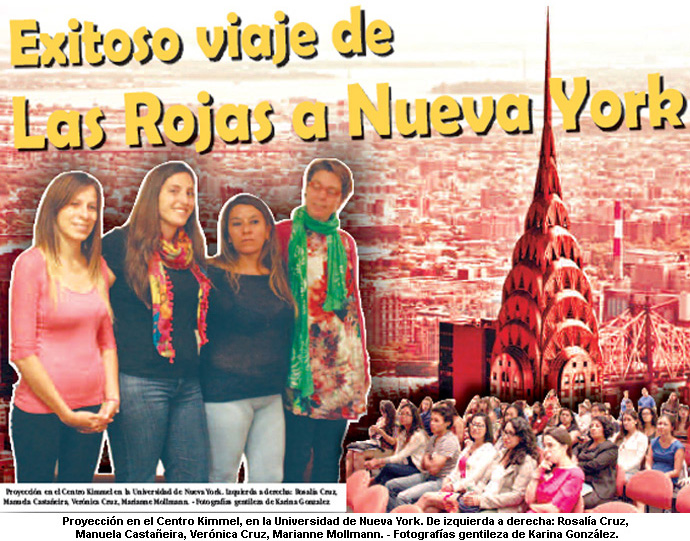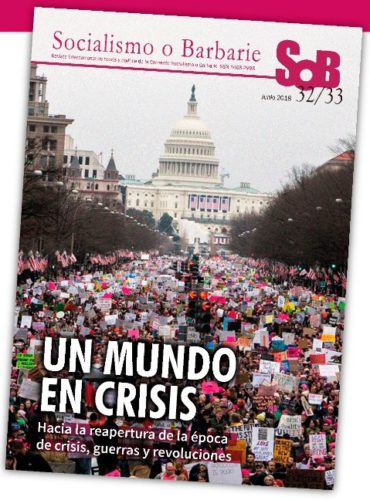
.
We present an interview we had with Manuela Castañeira, member of the national direction of “Las Rojas”, about being invited to New York city for the premiere in the USA of the documentary “Las Libres. la historia después de…”. The film shows how a Mexican non-profit organization helped 9 women condemned for practicing an abortion to get out of jail. These women were accused of having abortions, an act that is illegal in Mexico, with the exception of the Federal District, and it also shows how women struggle in other parts of the continent, with the right to abort as the central issue.
SoB: Please tell us how the premiere of the documentary in New York was.
Manuela: Las Rojas were invited to New York to be part of the premiere of the documentary “Las Libres, la historia después de…” at the New York University (NYU). The premiere was extremely successful; we are talking about an American university, an extremely large country, which gives this documentary and the fight that it entails, an important chance to be seen.
Hundreds of people and diverse organizations committed to the fight for women’s rights were there as well.
SoB: Which were the repercussions at NYU after showing the documentary?
M: It caused a great impact in the audience; we began to plan projections in other states, as well as in Canada. In the case of Argentina it helped to break the wall of silence that surrounds women struggles. At the end of the day this documentary is an extraordinary tool to expose the fights that we have to carry on in order to obtain abortion rights and also how we have to fight the Government in order to achieve it.
Sob: Briefly, tell us about the content of the documentary.
M: Well, it shows the experiences and campaigns of “Las Libres” a mexican organization that takes away from the government women who were sentenced to 20 or 30 years imprisonment for having abortions. An organization that fought and was able to take them out of jail. The documentary also shows the ties between the Argentine and American cases. In Argentina Las Rojas are an extremely active part in the women’s right movement, especially in the fights for the abortion right and the performance of unpunishable abortions[1].
When the documentary refers to the American case it explains the fact that these rights have been reduced, because there is an open battle with the conservatives groups. Meanwhile Obama is letting them do what they want, especially because the conservative sectors are extremely well organized and have a serious influence. For example they are cutting down abortion clinics budgets or giving money to the fundamentalist (especially religious) organizations in order to persuade and harass women that want to get an abortion, and even prevent them from getting contraceptive supplies.
This kind of situation shows the importance to organize ourselves and continue to fight for women’s rights.
SOB: Why do you think this kind of trip is important or relevant?
M: Even though the initial plan of this journey was to promote and to screen the documentary, it turned out to be something greater. In this regard I believe that the screening of the documentary was extraordinary, and that people who were there felt extremely touched by it, because while it is a very “hard” documentary, it has an interesting way of posing the problem. It shows the particular stories of these women, the history of “Las Libres”, the Argentinian experiences and struggles, the debates in the United States, and how all these cases relate with each other while having specific characteristics. In addition to the screening we spent an intense week sharing experiences and debates with Las Libres and also with Gustavo Montaña, the director of the documentary. We were invited as an expression of women’s movement in Argentina, as you can see in the documentary. Mariano Corbacho was also there, he was a member of the filming crew, in charge of directing the film in Argentina, and was also present when they entered the mexican jail for the first time to interview these women. Marianne Mollman was also there; she’s known for writing a report for Human Rights Watch regarding the situation in Argentina whose title already made a stand “ Reproductive rights in Argentina, ¿Reality or fiction?”. In addition to them the National Latin Institute for Reproductive Health participated in the discussions and was also in charge of the organization of the entire event. There were also American left organizations, some of them Trotskyite and other who were involved with Occupy Wall Street, a movement that played an important role in New York these past years.
SoB: Will there be common activities between all these organizations?
M: Well, this journey allowed us to see the diversity of struggles women face around the world, but also it led us to meet different organizations and groups who fight and condemn these injustices. In this context we have been having conversations about the possibility of launching a campaign to free Susana, María and Claudia, three women who were sent to jail in Jujuy, Argentina, for having an abortion.
This journey allowed organizations that have different links with the women’s movement, in some way with different perspectives also (we as Las Rojas we defend a socialist and feminist perspective), to communicate and to be aware of the numerous links between all activist that organizes themselves, not only to solve women’s problems, to defend women’s whose rights are not being respected, but also to fight against this capitalist and patriarchal system. That’s why I think it was a very rich experience for Las Rojas in particular and for women’s movement in general. It is a little step in the perspective of establishing a network of organizations to fight for women’s rights.
………………..
[1].- In 2012 the Supreme Court has ruled that abortion in case of rape or threat to women’s life is legal and that an affidtavit of being raped is enough to allow a legal abortion. It also ruled that provincial governments should write protocols for the request and treatment of legal abortions in case of rape or life threat.
Socialismo o Barbarie Nº 297, 24/07/14 (July 24, 2014)


